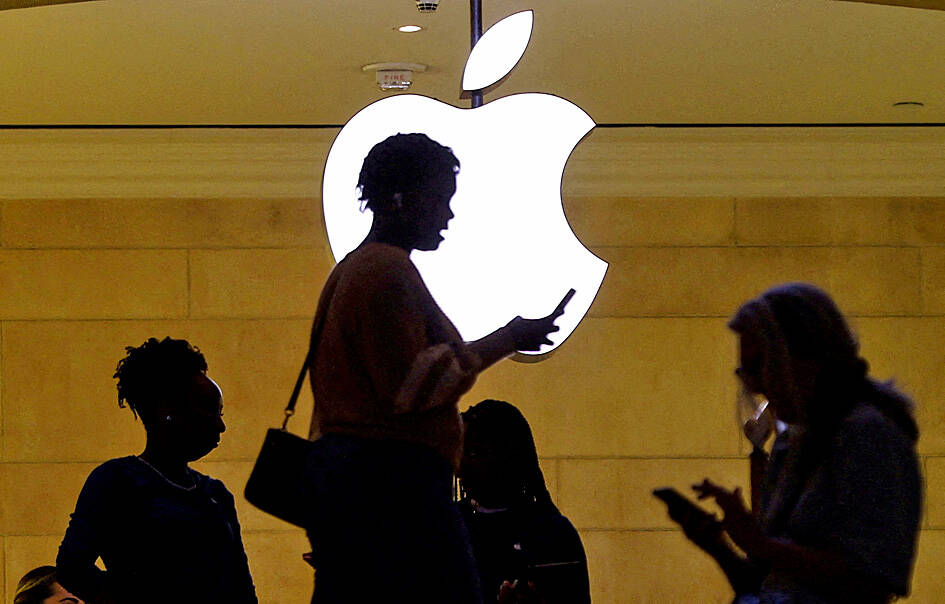Apple Inc’s board of directors has recommended shareholders vote against a proposal to end the company’s diversity, equity and inclusion (DEI) programs, going against the grain of decisions by other large US corporates.
The National Center for Public Policy Research, a conservative think tank, proposed Apple shareholders consider ending the firm’s DEI program to prevent lawsuits following a 2023 Supreme Court’s ruling against affirmative action in universities. But the Apple board has recommended voting against the proposal when it meets late this month.
"The proposal is unnecessary as Apple already has a well-established compliance program," said the board, which includes Tim Cook, the California-based company’s boss.

Photo: Reuters
"The proposal also inappropriately attempts to restrict Apple’s ability to manage its own ordinary business operations, people and teams, and business strategies," it said, accusing the think-tank of trying to "micromanage" the company.
The board said the iPhone maker "is an equal opportunity employer and does not discriminate in recruiting, hiring, training, or promoting on any basis protected by law."
The proposal will be put to a shareholder vote at Apple’s annual general meeting on Feb. 25.
Following in the footsteps of McDonald’s Corp, Ford Motor Co, Walmart Inc and a host of others, Meta Platforms Inc became the latest US firm to end its DEI programs.
The Friday announcement by Meta which owns Facebook and Instagram, comes amid what it described as "a changing legal and policy landscape."
US president-elect Donald Trump who takes office next week, has been a harsh critic of Meta and its owner Mark Zuckerberg for years, accusing the company of bias against him and threatening to retaliate against the tech billionaire once back in office.
Zuckerberg has been moving aggressively to reconcile with Trump since his election win in November last year, including donating US$1 million to his inauguration fund and hiring a Republican as his public affairs chief.
Republicans are also fiercely against DEI programs in corporate America, many of which were established in the aftermath of the Black Lives Matter movement and the nation’s attempt to reckon with longstanding racial disparities.

CHIP RACE: Three years of overbroad export controls drove foreign competitors to pursue their own AI chips, and ‘cost US taxpayers billions of dollars,’ Nvidia said China has figured out the US strategy for allowing it to buy Nvidia Corp’s H200s and is rejecting the artificial intelligence (AI) chip in favor of domestically developed semiconductors, White House AI adviser David Sacks said, citing news reports. US President Donald Trump on Monday said that he would allow shipments of Nvidia’s H200 chips to China, part of an administration effort backed by Sacks to challenge Chinese tech champions such as Huawei Technologies Co (華為) by bringing US competition to their home market. On Friday, Sacks signaled that he was uncertain about whether that approach would work. “They’re rejecting our chips,” Sacks

NATIONAL SECURITY: Intel’s testing of ACM tools despite US government control ‘highlights egregious gaps in US technology protection policies,’ a former official said Chipmaker Intel Corp has tested chipmaking tools this year from a toolmaker with deep roots in China and two overseas units that were targeted by US sanctions, according to two sources with direct knowledge of the matter. Intel, which fended off calls for its CEO’s resignation from US President Donald Trump in August over his alleged ties to China, got the tools from ACM Research Inc, a Fremont, California-based producer of chipmaking equipment. Two of ACM’s units, based in Shanghai and South Korea, were among a number of firms barred last year from receiving US technology over claims they have

It is challenging to build infrastructure in much of Europe. Constrained budgets and polarized politics tend to undermine long-term projects, forcing officials to react to emergencies rather than plan for the future. Not in Austria. Today, the country is to officially open its Koralmbahn tunnel, the 5.9 billion euro (US$6.9 billion) centerpiece of a groundbreaking new railway that will eventually run from Poland’s Baltic coast to the Adriatic Sea, transforming travel within Austria and positioning the Alpine nation at the forefront of logistics in Europe. “It is Austria’s biggest socio-economic experiment in over a century,” said Eric Kirschner, an economist at Graz-based Joanneum

OPTION: Uber said it could provide higher pay for batch trips, if incentives for batching is not removed entirely, as the latter would force it to pass on the costs to consumers Uber Technologies Inc yesterday warned that proposed restrictions on batching orders and minimum wages could prompt a NT$20 delivery fee increase in Taiwan, as lower efficiency would drive up costs. Uber CEO Dara Khosrowshahi made the remarks yesterday during his visit to Taiwan. He is on a multileg trip to the region, which includes stops in South Korea and Japan. His visit coincided the release last month of the Ministry of Labor’s draft bill on the delivery sector, which aims to safeguard delivery workers’ rights and improve their welfare. The ministry set the minimum pay for local food delivery drivers at